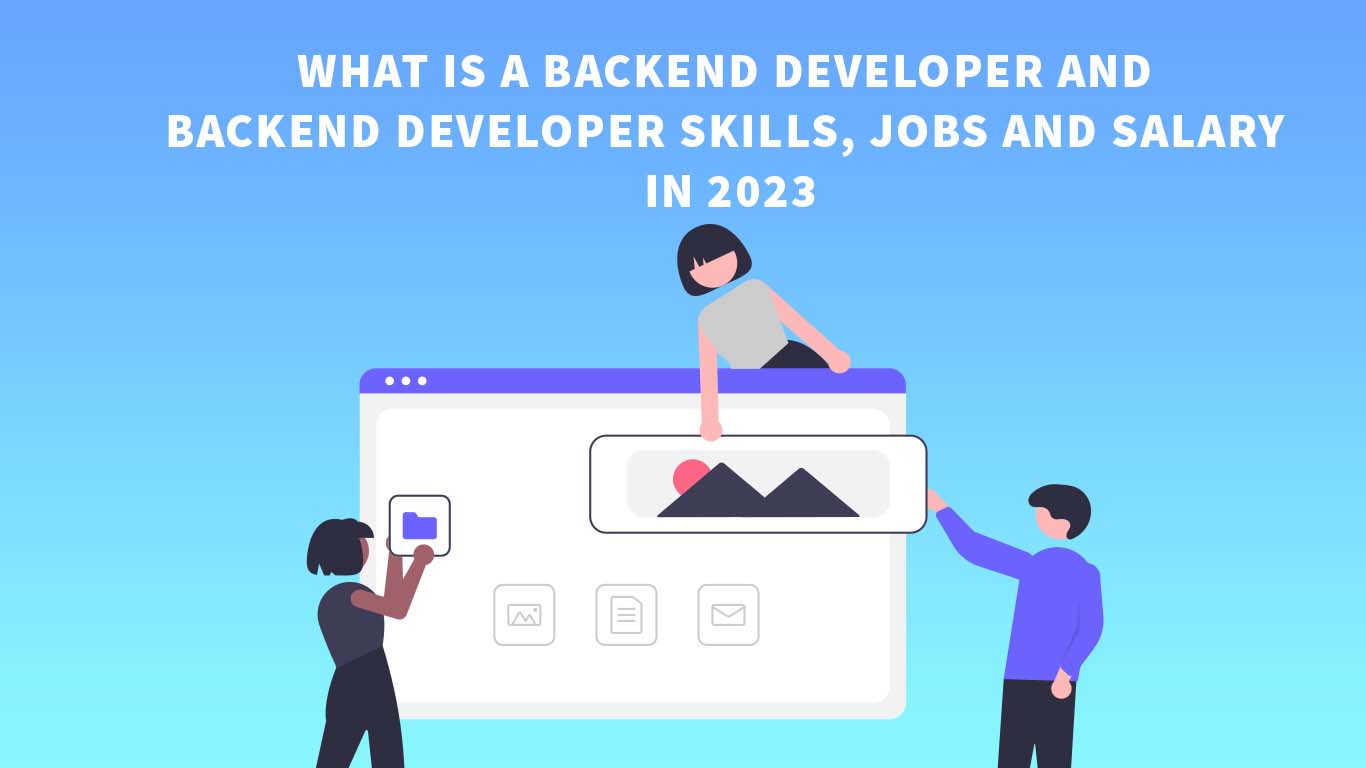What is a backend developer?
A backend developer is a software engineer who specializes in building the server-side of web applications. The backend of a web application is responsible for processing and storing data, managing user authentication and authorization, and serving content to the frontend of the application.
Backend developers work with programming languages such as Python, Ruby, Java, and PHP, and frameworks like Node.js, Flask, Django, and Ruby on Rails. They also work with databases such as MySQL, PostgreSQL, and MongoDB, and other technologies such as REST APIs, JSON, and XML.
Backend developers are responsible for designing and implementing the server-side of web applications, ensuring that they are secure, scalable, and performant. They work closely with frontend developers to ensure that the application’s user interface communicates efficiently with the server-side logic.
In summary, backend developers are responsible for the development and maintenance of the server-side of web applications, enabling the application to function properly and providing data to the frontend for display.
Backend developer skills
Backend developers need a range of technical and soft skills to be effective in their role. Here are some of the key skills required for a backend developer:
- Proficiency in programming languages: Backend developers need to be skilled in one or more programming languages such as Python, Ruby, Java, or PHP, as well as related frameworks and tools.
- Database design and management: Backend developers must be able to design and manage databases such as MySQL, PostgreSQL, and MongoDB.
- Web server technologies: Backend developers should have an understanding of web server technologies such as Apache and Nginx, as well as how to configure and manage them.
- REST APIs and web services: Backend developers should be able to design and develop REST APIs and other web services to expose data and functionality to other systems.
- Security: Backend developers need to be familiar with security best practices and techniques for securing web applications, including encryption, user authentication, and authorization.
- Performance optimization: Backend developers should have an understanding of performance optimization techniques such as caching and database indexing to improve the speed and scalability of web applications.
- Collaboration: Backend developers need to be able to work collaboratively with frontend developers, designers, and other team members to develop and deliver web applications.
- Communication: Good communication skills are essential for backend developers to understand project requirements, explain technical concepts, and work effectively with team members.
- Problem-solving: Backend developers need to be able to analyze complex problems and find solutions, often under tight deadlines.
In summary, backend developers need technical skills related to programming, databases, and web server technologies, as well as soft skills related to collaboration, communication, and problem-solving.
How to become a backend developer?
Here are some general steps to become a backend developer:
- Learn a programming language: Choose a programming language such as Python, Ruby, Java, or PHP and start learning its syntax, concepts, and features. Online resources like Codecademy, Udemy, and Coursera offer courses on programming languages.
- Learn a backend framework: Once you have a good grasp of a programming language, learn a backend framework such as Node.js, Flask, Django, or Ruby on Rails. These frameworks provide pre-built libraries and tools to simplify backend development.
- Learn databases: Backend developers need to understand databases and how to manage them. Learn SQL (Structured Query Language) and get hands-on experience with databases like MySQL, PostgreSQL, and MongoDB.
- Learn web server technologies: Backend developers should have an understanding of web server technologies such as Apache and Nginx, as well as how to configure and manage them.
- Build projects: Build small projects to apply what you have learned and practice your skills. Try building a simple web application with a frontend and backend.
- Collaborate with others: Join a community of developers or contribute to open-source projects to gain experience working with others and learn from their experience.
- Continue learning: Technology is constantly evolving, so it is important to continue learning and staying up-to-date with the latest trends and technologies. Attend conferences, read books, and follow blogs and podcasts related to backend development.
- Build a portfolio: Build a portfolio of projects to showcase your skills and experience to potential employers. Make sure to include descriptions of the technologies and frameworks used in each project.
- Apply for jobs: Apply for backend developer jobs that match your skills and experience. Create a resume that highlights your relevant experience and technical skills.
What does a backend developer do?
A backend developer is responsible for building and maintaining the server-side of web applications. They work with databases, web servers, and APIs to ensure that the application’s logic and functionality are working correctly. Here are some of the specific tasks that a backend developer might do:
- Design and build server-side architecture: Backend developers design and build the server-side architecture of web applications, including data models, APIs, and database schemas.
- Develop APIs: Backend developers develop APIs (Application Programming Interfaces) that enable web applications to communicate with other applications and services.
- Manage databases: Backend developers design, develop, and manage databases, ensuring that data is organized, secure, and easy to access.
- Test and debug: Backend developers test and debug code to ensure that it is working correctly and fix any issues that arise.
- Collaborate with front-end developers: Backend developers work closely with front-end developers to ensure that the front-end and back-end of web applications are integrated seamlessly.
- Implement security measures: Backend developers implement security measures to protect web applications from security threats such as hacking and data breaches.
- Monitor performance: Backend developers monitor the performance of web applications, ensuring that they are running smoothly and optimizing performance when necessary.
- Maintain documentation: Backend developers maintain documentation of the application’s code, database structure, and APIs to ensure that other developers can understand and modify the application in the future.
Overall, backend developers are responsible for building and maintaining the server-side of web applications, ensuring that they are secure, reliable, and scalable.
Backend developer jobs and salary in 2023
In summary, becoming a backend developer requires learning programming languages, backend frameworks, databases, web server technologies, and building projects to gain experience. Continuously learning and building a portfolio will help you land your first job as a backend developer.
As an AI language model, I don’t have access to the latest job market data. However, I can provide you with general information about backend developer jobs and salaries based on historical trends.
Backend developers are in high demand as more businesses move their operations online, creating a growing need for web-based applications. Backend developers can work in a variety of industries, including technology, finance, healthcare, and e-commerce, among others.
The average salary for a backend developer varies depending on location, experience, and industry. According to Glassdoor, as of March 2023, the average base pay for a backend developer in the United States is approximately $93,000 per year. However, this figure can range from around $65,000 to over $130,000, depending on factors such as job location, years of experience, and skillset.
In addition to a competitive salary, backend developer jobs often offer benefits such as health insurance, retirement plans, and flexible work schedules. Many companies also offer opportunities for professional development and advancement.
Overall, backend developer jobs are expected to continue to be in high demand in 2023 and beyond as more companies invest in web-based applications and technologies.
Conclusion:
A backend developer is a software engineer responsible for building and maintaining the server-side of web applications. They work with databases, web servers, and APIs to ensure that web applications are secure, reliable, and scalable. To become a backend developer, one must have a good understanding of programming languages, backend frameworks, databases, web server technologies, and security measures. Continuous learning and building a portfolio are key to landing a backend developer job. The job outlook for backend developers is positive, with increasing demand in various industries, and salaries are competitive. Overall, backend developers play a crucial role in the development of web applications, making them an essential part of the tech industry.


